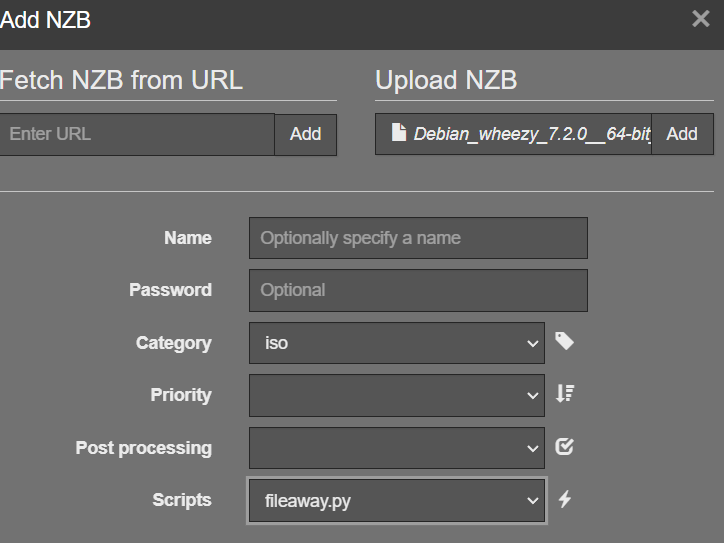File Away Flow is an API that allows you to move files between folders, it is helpful for postprocessing files, downloaded in containers like Sabnzbd, nzbget or Jdownloader.
Consider the following scenario:

If we want to move files after they are downloaded from (/share/docker_volumes/sabnzbd/downloads) to (/share/nas/isos),
we can use a postprocess script, but it will execute in the container (Sabnzbd) and not in the host machine,
so we will need to mount the (/share/nas/isos) as part of the container which will require to create a new
mountpoint inside the container and modify the Dockerfile. or we can use this API that runs on the host machine, and the postprocess script
simply calls this API to do the moving.
The api only has 2 endpoints:
/healthto check if the service is healthy
> curl http://localhost:8002/api/health
{
"status": "success",
"message": "FileAwayFlow API is up and running"
}/api/files/moveendpoint to move files
> curl --request POST \
--url http://localhost:8002/api/files/move \
--header 'Content-Type: application/json' \
--header 'X-API-KEY: 123456' \
--data '{
"sourcePath" : "/share/docker_volumes/sabnzbd/downloads/iso/Debian_wheezy_7.2.0__64-bit_installer_iso_for_CD_or_USB_flash_dr",
"targetPath": "/share/nas/iso/Debian_wheezy_7.2.0__64-bit_installer_iso_for_CD_or_USB_flash_dr"
}'
{
"status": "success",
"message": "File /share/docker_volumes/sabnzbd/downloads/iso/Debian_wheezy_7.2.0__64-bit_installer_iso_for_CD_or_USB_flash_dr moved successfully"
}This project consists of two parts, the API and the postprocess script.
to build the API you need to install rust and cargo (https://www.rust-lang.org/tools/install).
cargo build --color=always --profile release --package FileAwayFlow --bin FileAwayFlow
Finished `release` profile [optimized] target(s) in 2.02sThe binary should be in the target/release directory, copy the binary file to /usr/local/bin/fileawayflow
the api can be run by any user, just make sure the user has the proper permissions to manipulate the files.
Alternatively if you don't want to build it I've provided a binary for linux-x64 as a release asset https://github.com/ivaano/FileAwayFlow/releases. Tested only on debian 12, but it should work fine on any x64 linux distro.
Location:
> sudoedit /etc/systemd/system/fileaway.serviceContents:
[Unit]
Description=API to move files around.
After=syslog.target network.target
[Service]
User=ivan
Group=ivan
UMask=0002
Type=simple
Environment="API_KEY=secret"
ExecStart=/usr/local/bin/fileawayflow 8002
TimeoutStopSec=10
KillMode=process
Restart=on-failure
[Install]
WantedBy=multi-user.targetTo start the service on boot using systemctl:
> sudo systemctl daemon-reload
> sudo systemctl enable fileaway.service
> sudo systemctl start fileaway To check service status:
> sudo systemctl status fileaway
● fileaway.service - API to move files around
Loaded: loaded (/etc/systemd/system/fileaway.service; enabled; preset: enabled)
Active: active (running) since Wed 2024-10-23 15:06:11 PDT; 2s ago
Main PID: 647632 (fileawayflow)
Tasks: 7 (limit: 9357)
Memory: 1.1M
CPU: 4ms
CGroup: /system.slice/fileaway.service
└─647632 /usr/local/bin/fileawayflow 8002
Oct 23 15:06:11 zenyata systemd[1]: Started fileaway.service - API to move files around.
Oct 23 15:06:11 zenyata fileawayflow[647632]: 🚀 Server started successfully, listening on port 8002API_KEY is the API key that will be used for authentication, if is not set, it will default to 123456
The server only takes 1 argument which is the port number. The default port is 8000 in our service example
are passing the 8002 argument to start the server on port 8002.
The second part involves the postprocessing script that will run once the download is complete, there is a sample script for sabnzbd, the script is really simple, it uses urllib to avoid adding any dependencies and it takes sabnzbd arguments, checks if the ir a match in the categories we can process, and then makes the call to the api to do the actual move.

